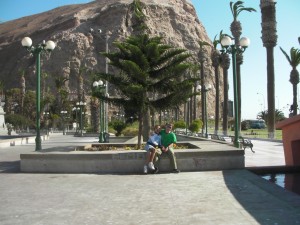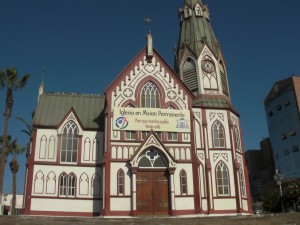 Plaza in Arica
Plaza in Arica
 Iglesia San Marcos designed by Alexandre Gustave Eiffel (same man who designed the Eiffel Tower) It’s made entirely of stamped and molded cast iron, prefabricated in Paris and reassembled in Arica.
Iglesia San Marcos designed by Alexandre Gustave Eiffel (same man who designed the Eiffel Tower) It’s made entirely of stamped and molded cast iron, prefabricated in Paris and reassembled in Arica.
This is how it was supposed to work. The bus from Puno would drop us off at the bus station in Tacna, we would get into a collectivo ( a small van carrying about 12 people) that would take us across the border to Arica and hopefully drop us off at the bus station in Arica where we would find a tourist booth and a someone who spoke english could help us find a hotel. Here’s what really happened.
The bus didn’t drop us off at the bus station, instead we were dropped off in some alleyway in Tacna. This must have been common practice as there were several cab drivers waiting. Well, they weren’t actually waiting, they were yelling in Spanish, jostling each other, trying to get passengers attention. Bleary eyed we got our luggage, and headed out of the alley. We were immediately swarmed with taxi offers. The problem was we didn’t know where to go, and with all the confusion, it was hard to think. We had heard you caught the cabs or collectivos to Chile at the bus station. After looking around and realizing the bus station was no where near, we picked a taxi and explained, as best we could with a lot of hand motions, where we needed to go. Luckily he understood, and this bought us a little time to try and come up with a plan.
As we pulled into the bus station, a man ran up to the cab and chased the cab into the bus station parking lot. He was saying something we couldn’t understand and our cab driver was yelling at him. As soon as our cab stopped, he was there, along with 4 other guys trying to get our business. We had been warned by an American we met that you needed to really watch your luggage at the Tacna bus station. In confusion, just like this, his computer had been stolen. Of course we had been warned at every bus station to watch our luggage. By this time our luggage had expanded. In addition to our backpacks and 2 small rolling suitcases, we had 2 more soft Peruvian backpacks to store our sleeping bags, and one soft Peruvian duffel bag that held our dirty clothes and souvenirs. What was our plan for keeping the luggage from getting stolen? Tessa. She was our go to girl. Dan, Tristan and I would unload the luggage and Tessa would guard it. It may seem strange to you to have a nine year old girl keeping guard, but it worked. Who would steal from a little girl???
So our luggage is out of the car, Tessa is keeping watch, and the taxi drivers have gotten into a shoving match over who is going to help us. What do we do in situations like this? We just walk away. They all followed us into the terminal, yelling in Spanish how much they would charge. At least that’s what we think they were yelling as we couldn’t understand them. We walked around the small terminal aimlessly, not sure what to do. One guy stayed with us, and I understood he would charge us 15 Sols per person to take us across the border to Arica. This was not a simple thing. It was about an hour to the border, wait in line, help us cross, then drive another half hour or so to Arica. For $18.00 US total, it sounded like a great deal. Dan always asks me in times like this, with several tourist operators or several taxi drivers crowding around, how do I know which one to go with? Faith and intuition. And I look at their eyes. If I intuitively feel they are ok, and they have nice eyes, they get our business. Simple. Our taxi driver ended up being the one who chased our cab down as we drove in. Even though someone later came up to us and told us he would take us for 10 Sols, we kept our guy.
The drive was uneventful. We made small talk with the driver as best we could. He spoke no English, so there was a lot of hand motions. Normally we are much better with Spanish, but today we were off our game. We have an interesting approach to interpreting and speaking the language. Dan and especially Tristan are great at hearing it. If they hear it, they can usually understand it. Dan won’t speak it though, and Tristan will sometimes speak. I am much better at speaking and reading Spanish. In fact, when someone speaks Spanish to me, I find that I’m not really listening to it as much as I am looking at them, looking at their eyes for visual cues as to what they are saying. It makes you stay very present moment, very present in the conversation. A lot of people, including myself sometimes, in a normal conversation, are generally fixated on what they are going to say, and only partially listen to the speaker. When you don’t know the language, you have to really pay attention and get all the clues you can. You can’t be thinking of an answer if you can’t understand the question.
Our first stop was checking out of Arica. Leaving our luggage in the taxi, we had to walk through the checkout procedure and wait on the other sidefor the taxi driver to pick us up. Our driver, Gustav, was very helpful, getting us to the front of the line and quickly through. Next, a short ride down the road and we were checking into Chile. Chile has a visa reciprocity with the US. The US charges a high visa fee for Chileans coming into the US and the Chileans charge an equally high fee for US cititzenscoming into Chile. We caught a break here. After our immigration officer thoroughly checked our passports, our fee was waived. It seems the fee applies only to those who fly in, not come on the bus. There was a little concern about when we had been in the US due to the swine flu, but our passports clearly showed we had spent the last months in Peru, Aruba and Curacao. We were checked through without a problem, and back in the taxi for the short ride to Arica.
We asked Gustav to drop us off at the bus station, again thinking we could get some hotel information. Instead he dropped us off at a taxi parking lot we thinkwas close to the bus station. As we unloaded our bags, again unsure what to do, Gustav started talking to a Chilean man. It turned out this was the “Money Man”. Gustav knew we would need to get some Chilean Pesos and this was the Money Exchange man. We had a vague idea of the exchange rate but we really weren’t prepared for it. The rate at the time was $567.00 Chile Peso to $1.00 US dollar. We gave Exchange Man some money and he gave us back $1000.00 Peso bills. In Spanish I asked Gustav if this was the correct exchange rate so we weren’t getting ripped off and he said it was. We then asked “Cuanto cuesta taxi?” or how much is the taxi. Sometimes, actually a lot of times, I get mixed up and ask “Cuanto quesa?” or How much cheese?, but this time I got it right. We couldn’t understand his answer because now the amounts were in mil or thousands, so he tooksome money, folded it up, gave it to Dan and said taxi. That cleared it up. A taxi should run us 1500 pesos. We thanked him for his help, then consulted the Lonely Planet guide on what hotel to go to. We decided we might try the Sunshine Hostel. It had good ratings on the internet. Dan hailed a taxi, and we told him the name of the Hostel, which was supposed to be near the bus stop, but he never heard of it. Dan showed him the address in the guidebook and he drove us there. The Sunshine Hostel did not live up to its name on the outside. It seemed to me we weren’t in a very good part of town. The kids andI stayed in the taxi while Dan went to check it out. He came back and told us the place was locked up and he didn’t see anyone around, so we were back to the guidebook. I had another one picked out, close to the Plaza (again, when all else fails, find a hotel near the Plaza) and we showed the driver the address. On the way there though, I had second thoughts, as the price seemed high, and I changed my mind and gave him another address. He was very nice, and wasn’t the least upset with the driving around and our inability to converse with him in Spanish. I don’t know if it was the dialect, it was too early in the morning, or the Chilean people spoke too fast for us, but we couldn’t understand what he was saying. He did get us to the Hotel Sotomayor, which was conveniently located about a block from the Plaza.
This is what the Lonely Planet guidebook says about the Hotel Sotomayor “This central hotel may be a tad faded around the edges but it retains its reputation for extremely courteous service…” It was faded, but the room, with 1 doulbe and 2 twin beds was clean and the manager without asking, took $10.00 US off the price. Breakfast was included, so was internet. Bellhops carried our bags to the room and refused a tip. The elevator was very small, enough for 2 people and 1 bag of luggage. Tristan refused to ride in it. For $50.00 a night, right next to the Plaza, in a resort town, it was a great deal.
Arica is not a big city. The population is about 185,000 people. It is located on the Pacific Ocean and is a beach resort town, complete with casinos. From the first moment we knew we weren’t in Peru anymore. First, while the people at the hotel and the lady at the empanada stand we had lunch at, were nice, they weren’t the same nice as Peru. In Peru, the pace was slower, even in the larger cities, and people smiled and seemed genuinely interested in us. In Chile, it was the hectic pace of life in America. The people seemed very preoccupied, seemed in a rush, and no one WOULD speak English. I say they wouldn’t speak english, not that they couldn’t, as many signs were in english, english music played everywhere (in the malls, in taxis), and movies were english with spanish subtitles. They wouldn’t have all this if people weren’t capable of speaking/understanding english. It was very frustrating, because if you pinned them down, they would understand what you were saying, but they didn’t like it. I really got the feeling that they weren’t that enthused about Americans. They also just didn’t have the beauty and grace of the Peruvian people. Now, of course, not all were unfriendly, (and it wasn’t so much unfriendly as uninterested), but they definitely were “hurried”.
Our hotel staff couldn’t do enough for us, even stopped using their work computer to let me on to look up hotels. The city was alive and bustling at night and we had some great people watching. We even enjoyed a movie. So Arica wasn’t all bad, but we didn’t stay there long. We had two areas of Chile we wanted to see before heading back. The first was San Pedro de Atacama, a high plains desert where we were going to view the stars in the clear desert night, and La Serena, back on the coast, to take a boat to a remote island to see the penguins. The next evening we were back on the overnight bus to San Pedro de Atacama, the place we would all fall in love with.


Write a Comment
You must be logged in to post a comment.